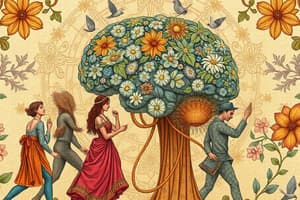Podcast
Questions and Answers
What are the two roots that form the word 'psychology'?
What are the two roots that form the word 'psychology'?
- 'psych' and 'study'
- 'psyche' and 'logos' (correct)
- 'psyche' and 'ology'
- 'psych' and 'ology'
Which philosopher is mentioned in relation to the evolution of psychology?
Which philosopher is mentioned in relation to the evolution of psychology?
- Socrates
- Aristotle
- Immanuel Kant
- René Descartes (correct)
What does the study of psychology include according to its roots?
What does the study of psychology include according to its roots?
- The study of the mind only
- The interplay between philosophy and physiology (correct)
- The examination of human emotions exclusively
- The science of behavior only
Which option represents a significant field that psychology has evolved from?
Which option represents a significant field that psychology has evolved from?
In the context of psychology's evolution, which statement best reflects the relationship between mind and study?
In the context of psychology's evolution, which statement best reflects the relationship between mind and study?
What is the primary purpose of using a control condition in an experiment?
What is the primary purpose of using a control condition in an experiment?
What does it mean if there is a difference in the dependent variable between experimental conditions?
What does it mean if there is a difference in the dependent variable between experimental conditions?
Which statement best describes a confounding variable?
Which statement best describes a confounding variable?
Why is it important to control variables in an experiment?
Why is it important to control variables in an experiment?
What does violating the 'Cardinal Rule' in experimental design imply?
What does violating the 'Cardinal Rule' in experimental design imply?
What year was the first formal laboratory for research in psychology established?
What year was the first formal laboratory for research in psychology established?
Which school of thought focuses on breaking consciousness into its components?
Which school of thought focuses on breaking consciousness into its components?
Who was the first president of the American Psychological Association (APA)?
Who was the first president of the American Psychological Association (APA)?
What major topic was studied and published as the first journal in psychology in 1881?
What major topic was studied and published as the first journal in psychology in 1881?
What does Functionalism primarily seek to understand?
What does Functionalism primarily seek to understand?
In what year did G. Stanley Hall and others establish the APA?
In what year did G. Stanley Hall and others establish the APA?
Which university did G. Stanley Hall attend where he became a student of Wundt?
Which university did G. Stanley Hall attend where he became a student of Wundt?
Which of the following best distinguishes Structuralism from Functionalism?
Which of the following best distinguishes Structuralism from Functionalism?
What is the relationship established when two variables are measured simultaneously?
What is the relationship established when two variables are measured simultaneously?
Which of the following factors is NOT typically considered when planning research involving variables?
Which of the following factors is NOT typically considered when planning research involving variables?
Which scenario best connects aggression and ethics in research design?
Which scenario best connects aggression and ethics in research design?
Which of the following correctly describes the potential outcome when two correlated variables are analyzed?
Which of the following correctly describes the potential outcome when two correlated variables are analyzed?
What implication does it have if there is no manipulation of the independent variable in a study?
What implication does it have if there is no manipulation of the independent variable in a study?
What is the primary function of the amygdala within the limbic system?
What is the primary function of the amygdala within the limbic system?
Which part of the brain is responsible for coordination, equilibrium, and fine motor skills?
Which part of the brain is responsible for coordination, equilibrium, and fine motor skills?
Which of the following is NOT a function of the hypothalamus?
Which of the following is NOT a function of the hypothalamus?
What type of brain hemisphere specialization is the left hemisphere known for?
What type of brain hemisphere specialization is the left hemisphere known for?
What is the role of the thalamus in the brain?
What is the role of the thalamus in the brain?
Which statement about the corpus callosum is true?
Which statement about the corpus callosum is true?
Which function is primarily associated with the forebrain?
Which function is primarily associated with the forebrain?
What part of the brain is involved in spatial location and voluntary movements?
What part of the brain is involved in spatial location and voluntary movements?
Which lobe of the brain is primarily responsible for processing vision?
Which lobe of the brain is primarily responsible for processing vision?
Which of the following statements about genes is true?
Which of the following statements about genes is true?
Study Notes
Evolution of Psychology
- Psychology combines "psyche" (mind) and "Logos" (study).
- Emerged as an independent field in 1879 alongside physiology.
- First formal laboratory for psychological research established at the University of Leipzig.
- First published journal on psychology appeared in 1881, focusing on consciousness.
Key Figures
- G. Stanley Hall, student of Wundt, introduced psychology to the U.S. and established Johns Hopkins University.
- In 1887, the first American psychological journal was published.
- In 1892, Hall and 26 others founded the American Psychological Association (APA), with Hall as the first president.
Schools of Thought
- Structuralism breaks consciousness into components, focusing on the elements of experience.
- Functionalism emphasizes the purpose of consciousness and behavior, exploring how mental processes function.
Research Methodologies
- Importance of control in psychological experiments to establish baselines for comparison.
- Independent variables (IV) and dependent variables (DV) are critical in determining causal relationships.
- Confounds may introduce differences in conditions leading to inaccurate conclusions.
Correlation Research
- Correlational studies examine the relationship between two variables measured simultaneously.
- They explore predictability, such as the connection between sleep and arousal.
Brain Structure and Function
- Cerebellum: Responsible for coordination, equilibrium, and fine motor control.
- Midbrain: Involved in spatial location and voluntary movements; houses reticular formation governing sleep and wakefulness.
- Forebrain: Includes critical components like:
- Thalamus: Sensory relay station (excludes smell).
- Hypothalamus: Regulates basic needs (hunger, thirst, sex) and body temperature.
- Limbic System: Handles emotions and memory; includes the amygdala (aggression) and hippocampus (memory formation).
- Cerebrum: The largest and most complex part, associated with intellect and higher functions.
- Corpus Callosum: Connects the two hemispheres of the brain for integrated functioning.
Brain Lobes
- Occipital Lobe: Processes vision.
- Parietal Lobe: Responsible for touch and spatial awareness.
- Temporal Lobe: Processes hearing and language.
- Frontal Lobe: Involved in motor function, planning, and decision-making.
Hemisphere Specialization
- Left Hemisphere: Focused on verbal skills, language, and logic.
- Right Hemisphere: Handles spatial and visual tasks, music, and art.
- Split-brain research has revealed differential functions of the hemispheres.
Genetic Influences
- Genes are made of chromosomes; traits can be dominant or recessive.
- Dominant genes mask the expression of recessive genes.
- Genotype refers to the genetic makeup of an individual.
Studying That Suits You
Use AI to generate personalized quizzes and flashcards to suit your learning preferences.
Related Documents
Description
Explore the foundational concepts of psychology in Chapter 1, which delves into the historical evolution of the field. This quiz will assess your understanding of key philosophical ideas and major developments that shaped psychology as we know it today.



